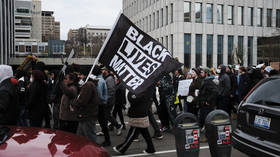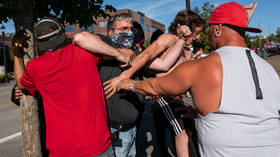Americans deeply split over discrimination – WSJ poll

Americans are divided along partisan lines over which population groups in the United States face discrimination, according to a Wall Street Journal poll published on Saturday. While most Democrats see prejudice as a problem for US minorities, Republicans tend to believe that it is the issue white people have to cope with.
According to the survey, some 59% of GOP voters believe that white Americans face discrimination or prejudice, compared to only 21% of Democrats who agree with this point. Meanwhile, 88% Democrats responded that Black people face biased attitudes, compared with 49% of Republicans who said so.
Democrats are also more prone to thinking that discrimination against lesbian and gay Americans is a problem (85%), while only 38% Republicans hold a similar opinion. The same split is noticeable over Latinos and Jews, with more than 80% Democrats identifying prejudice towards these groups as a problem. Only 40% and 49% Republicans believe discrimination towards Latinos and Jews respectively to be an issue.
The WSJ survey also found that 61% of Republicans believe discrimination is a problem for Christians in America, with only 25% of Democrats supporting this view.
The report also indicates that US voters are divided on the issue rather by their political views than by race, or age.
These data to some extent echo the results of several previous polls. An October LX New/YouGov poll showed that despite a slight uptick in US unity in the last two years, eight out of ten Americans still believe that they live in a divided country.
Another poll, conducted by the Economist magazine and YouGov in late August, found that two in five Americans believe a civil war is at least somewhat likely in the next decade, with Republicans more prone to expressing this view than Democrats.













